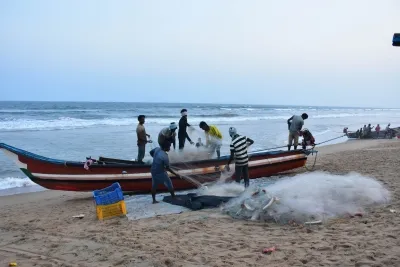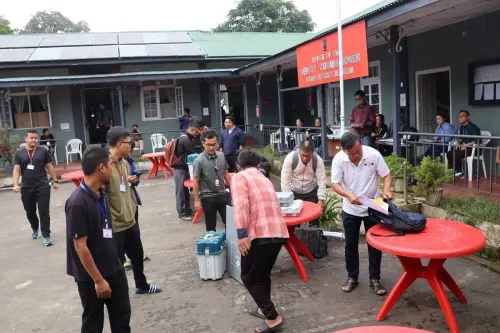Why Are TN Fishers Demanding a Price-Setting Committee as Tuna and Shrimp Rates Decline?

Synopsis
Key Takeaways
- Tamil Nadu fishermen are demanding a price-setting committee for fair pricing.
- Falling seafood prices are creating financial hardships for fishers.
- High-quality shrimp is being priced significantly lower than before.
- Government intervention is crucial for the sustainability of the fishing community.
- Declining tuna catch is exacerbating the economic crisis in the fishing sector.
Chennai, June 11 (NationPress) As the 61-day annual fishing ban in Tamil Nadu concludes on June 14, fishermen statewide are voicing their worries regarding the decline in seafood prices and are calling for government action to safeguard their livelihoods.
In Rameswaram, fishers have requested the state administration to establish a price-setting committee aimed at ensuring equitable pricing, particularly for shrimp.
“Fishermen work tirelessly at sea, yet it is disheartening that they cannot secure a reasonable price for their catch,” stated X. Nallathambi, president of the National Traditional Fishermen Federation.
Historically, high-quality shrimp sourced from Rameswaram and Mandapam fetches prices as high as Rs 700 per kilogram during peak season. Nonetheless, in the days following the end of the fishing ban, exporters are reportedly setting prices as low as Rs 300 per kilogram, leading to substantial financial losses for small-scale fishers.
Fishers assert that “Mandapam Shrimp,” recognized for its superior quality, has established a robust reputation in the export market. However, they find themselves devoid of any pricing authority. Nallathambi has urged the government to create a ‘Shrimp Price-Setting Committee’ comprising members from fishermen’s associations, the Marine Products Export Development Authority (MPEDA), and seafood exporters to guarantee fair and stable pricing.
Similarly, N. Devadoss, president of the Rameswaram Fishermen Cooperative Society, underscored that fishermen incur significant operational expenses, including fuel and taxes, which greatly contribute to the state’s economy and foreign exchange earnings.
“This demand has been outstanding for years. It’s time the government ensures a sustainable income for fishers,” he added.
Meanwhile, in Kasimedu, Chennai’s largest fishing harbor, fishermen are struggling with the dual impact of a steep drop in tuna catch and falling prices. Tuna, once a major export to countries such as Tunisia, Yemen, and China, has experienced a price decrease from Rs 68 to Rs 60 per kilogram in recent weeks. This marks a significant decline from last year's rate of Rs 150 per kilogram during the same season, as reported by trawler operators.
Compounding the crisis is the dwindling tuna yield. Trawlers that previously caught around 1,000 tonnes each month are now landing less than half that volume.
The reasons for the diminished catch remain ambiguous but are suspected to be related to shifting sea conditions and market disruptions. Fishermen caution that without swift intervention, their economic survival is in jeopardy.









